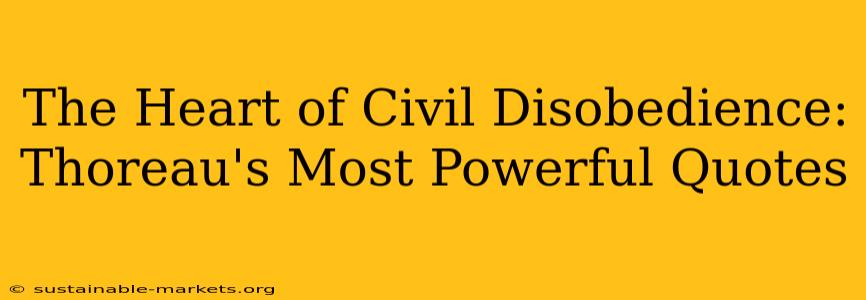Henry David Thoreau's essay, "Civil Disobedience," remains a cornerstone of political thought, inspiring activists and thinkers for generations. Its enduring power stems from Thoreau's articulation of individual conscience against unjust laws, a message as relevant today as it was in 1849. This exploration delves into some of Thoreau's most powerful quotes from this seminal work, analyzing their meaning and lasting impact. We'll also address some frequently asked questions surrounding this influential essay.
What is the main idea of Civil Disobedience?
The central theme of "Civil Disobedience" is the individual's moral obligation to disobey unjust laws. Thoreau argues that a government that infringes upon individual conscience is not worthy of allegiance. He champions the power of individual action, even if it means facing legal consequences, to challenge and ultimately change unjust systems. This principle is based on the belief that individual morality transcends the authority of the state. He uses the example of his own refusal to pay taxes that supported the Mexican-American War, a conflict he deemed morally reprehensible.
What are some of Thoreau's most famous quotes from Civil Disobedience?
Several quotes encapsulate the core arguments of "Civil Disobedience," resonating with readers across diverse backgrounds and time periods. Here are a few key examples:
-
"That government is best which governs least." This seemingly simple statement highlights Thoreau's belief in limited government. He doesn't advocate for anarchy, but rather a government that respects individual liberty and minimizes interference in personal affairs. The ideal government, in his view, facilitates the flourishing of individual conscience and self-reliance.
-
"If a man does not keep pace with his companions, perhaps it is because he hears a different drummer. Let him step to the music which he hears, however measured or far away." This quote emphasizes the importance of following one's own moral compass, even if it means diverging from societal norms. It underscores the uniqueness of individual conscience and the right to pursue one's own path, regardless of external pressure.
-
"I heartily accept the motto, 'That government is best which governs least'; and I should like to see it acted up to more rapidly and systematically. Carried out, it finally amounts to this, which also I believe—'That government is best which governs not at all'." This quote expands on the previous one, pushing the concept of limited government to its logical extreme. While acknowledging the practical need for some form of governance, Thoreau's ultimate ideal is a society where individuals are self-governing and moral, rendering external authority largely unnecessary.
-
"Must the citizen ever for a moment, or in the least degree, resign his conscience to the legislator?" This powerful question challenges the authority of the state over individual morality. Thoreau asserts that conscience is paramount, and no government can legitimately demand its subjugation. This forms the bedrock of his argument for civil disobedience.
-
"Under a government which imprisons any unjustly, the true place for a just man is also a prison." This quote highlights the moral imperative to resist injustice, even if it means personal sacrifice. Thoreau suggests that passive compliance with an unjust system is morally equivalent to complicity in that injustice.
How does Civil Disobedience relate to modern-day activism?
Thoreau's ideas have profoundly influenced modern-day activism. The principles of nonviolent resistance, championed by Mahatma Gandhi and Martin Luther King Jr., draw heavily from Thoreau's emphasis on individual conscience and the power of non-violent protest against unjust laws and systems. From civil rights movements to environmental activism, Thoreau's essay continues to inspire individuals and groups to challenge authority and fight for social justice through peaceful means. His work serves as a philosophical foundation for many forms of modern protest and social change.
What is the significance of Thoreau's act of civil disobedience?
Thoreau's personal act of refusing to pay taxes, while seemingly small, holds immense symbolic significance. It wasn't merely a protest against a specific war; it was a demonstration of the power of individual conscience to challenge a government’s authority. His willingness to accept the consequences of his actions – imprisonment – served as a powerful example of the commitment required to uphold one's moral principles. This act cemented the essay's message, transforming abstract philosophical arguments into a tangible example of lived resistance.
What are the criticisms of Thoreau's Civil Disobedience?
While highly influential, "Civil Disobedience" is not without its critics. Some argue that Thoreau's ideal of a minimalist government is unrealistic or impractical, pointing to the necessity of a strong state to maintain order and provide essential services. Others criticize the potential for selective disobedience, where individuals might choose to disobey only those laws they find personally objectionable, creating chaos and undermining the rule of law. Furthermore, the lack of a detailed plan for transitioning to a more just society beyond individual acts of resistance has been a subject of ongoing discussion. These criticisms highlight the complexities and challenges inherent in implementing Thoreau's vision in practice.
In conclusion, Henry David Thoreau's "Civil Disobedience" remains a powerfully relevant and enduring piece of political philosophy. Its core message—the importance of individual conscience in challenging unjust systems—continues to resonate and inspire activists and citizens today. By understanding his key arguments and the ongoing debate surrounding his ideas, we can better appreciate the lasting impact of this seminal work.

